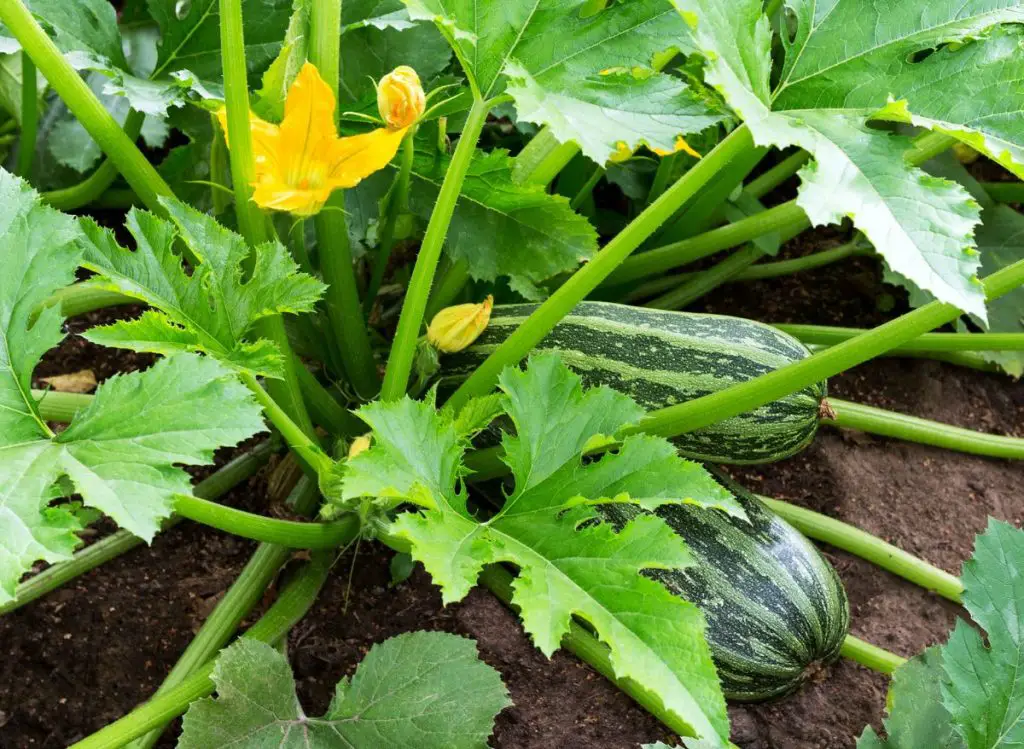
Zucchini (also known as Cucurbita pepo or courgettes) is a summer squash plant that yields a fruitful crop.
Like people, some plants flourish surrounded by others. Companion planting is the method of growing several crops near one another to promote healthy crop production.
Proper companion planting with your zucchini can keep pests away from your plants and provide a healthy and nutritious harvest.
It also grows quickly and produces an abundant crop, making it popular for home gardens.
Choosing the proper zucchini companion plants is one of the best ways to ensure your harvest is plentiful.
If Your Zucchini Is Turning Yellow and Rotting, I encourage you to read this article to find out why.
Ideal Growing Conditions For Zucchini Plant
Zucchini plants offer tremendous benefits and have low maintenance requirements. If you give them everything they need to thrive, they will reward you with plentiful yield.
The table below shows the ideal growing conditions for zucchini plants.
| Scientific name | Cucurbita pepo |
| Family | Cucurbitaceae |
| Most common Zucchini Names | – Acorn Squash – Zucchini – Courgette – Pumpkin – Squash – Field Pumpkin – Marrow – Ornamental Gourd – Patty Pan Squash – Spaghetti Squash – Summer Squash – Winter Squash |
| Phonetic Spelling | koo-KER-bih-ta PEP-oh |
| Zucchini Life Cycle | – Annual – Tender annual |
| Ideal Zucchini pH level | 5.8 and 6.8. |
| Sun Exposure | It thrives in full sun |
| Plant Type | – Annual – Vine – Edible – Warm Season Vegetable – Ground Cover – Vegetable |
| Zucchini Plant’s Size | – Height: 12 to 36 In. (30.48 to 91.44 cm) – Spread: 24 to 48 In. (60.96 to 121.92 cm) |
| Maintenance Requirements | Easy to Grow |
| Zucchini Plant Bloom Time | – Late summer – Early fall – Mid-summer |
| Zucchini Plant Flower Color | Yellow |
| Average Time to Maturity | 35 to 60 days, depending on the zucchini variety |
| Pests | – Aphids – Striped cucumber beetles – Squash bug – Squash vine borer |
| Common Zucchini Diseases | – Bacterial wilt (AKA Erwinia tracheiphila) – Downy mildew – Powdery mildew – Scab |
| USDA Hardiness Zone | 3 to 9 |
| Country Or Region Of Origin | North America |
What Is Companion Planting?
Have you ever heard the saying “you are the average of the 5 people you spend most of your time with”? Well, the same goes for companion planting. Companion planting is a proven gardening method that improves and protects vulnerable crops. With companion planting, gardeners plant specific crops near each other to attract beneficial insects, prevent pests, and stimulate growth.
Plants with known positive relationships should be planted within two or three rows. Plants that have adverse or detrimental relationships
Planting the same type of crops typically more quickly spreads infestation of pests or diseases (Source: West Virginia University)
The benefits of companion planting include:
- Detering harmful insects
- Providing support for crops
- Providing weed suppression
- Offering shade to smaller plants
- Promoting better pollination and soil fertility
- Enhancing flavor and boosting yields
- And saving precious garden space.
- Attracting beneficial insects
- And increasing your overall soil health.
Zucchini Companion Plants
The most popular companion planting is called “The Three Sisters Garden,” including Zucchini, corn, and beans.
- Taller plants, like corn, can provide a natural support trellis and shelter for beans, peas, and other climbing crops.
- In return, beans and peas provide nitrogen to the soil for the corn and squash plants.
- Squash and pumpkin leaves shade the smaller bean and pea plants that need sun protection and provides weed suppression.
Zucchini companion plants promote their overall growing conditions.
Here is a list of zucchini companion plants that have proven to be effective over time.
1- Corn (Zea Mays)
Over 3,500 years ago, indigenous peoples in North America developed one of the oldest companion planting methods, known as the Three Sisters Garden.
Three Sisters includes corn, beans, and squash. Like other Cucurbits, zucchini has big and broad leaves, each reaching around 12-inches across.
Squash and corn are excellent companions since they share the exact growth requirements. Both will thrive with the sun, consistent watering, and regular feeding.
By shading the soil and blocking out sunlight, zucchini foliage stops weeds from invading while helping to maintain moisture in the ground.

2- Beans (Phaseolus Vulgaris)
The third Sister is beans, mainly green beans with a vining habit. Pole beans like to climb, and corn plants provide the ideal vertical support for beans to spiral themselves around with their ornamental and sturdy stalks.
Zucchini is a heavy feeder, usually requiring additional fertilizer during the growing season. Planting bush or pole beans with the zucchini provides beneficial nutrients to the soil. At the same time, the beans will also benefit by having their roots shaded and fewer weeds infestation.
In turn, beans build soil fertility for themselves and nearby plants, which create excellent conditions when growing heavy feeders, including squash and corn.
Beans are also nitrogen fixers; they pull nitrogen from the atmosphere and make it available for their roots to absorb in the soil.
In turn, squash’s role as one of The Three Sisters Garden is pest protection. Its giant leaves and stems are wrapped in needle-like hairs and sharp spines that discourage critters and rodents from helping themselves to your beans and corn.
If you are looking to grow beans, here is Everything You Need to Know Before Starting Green Beans Indoors.
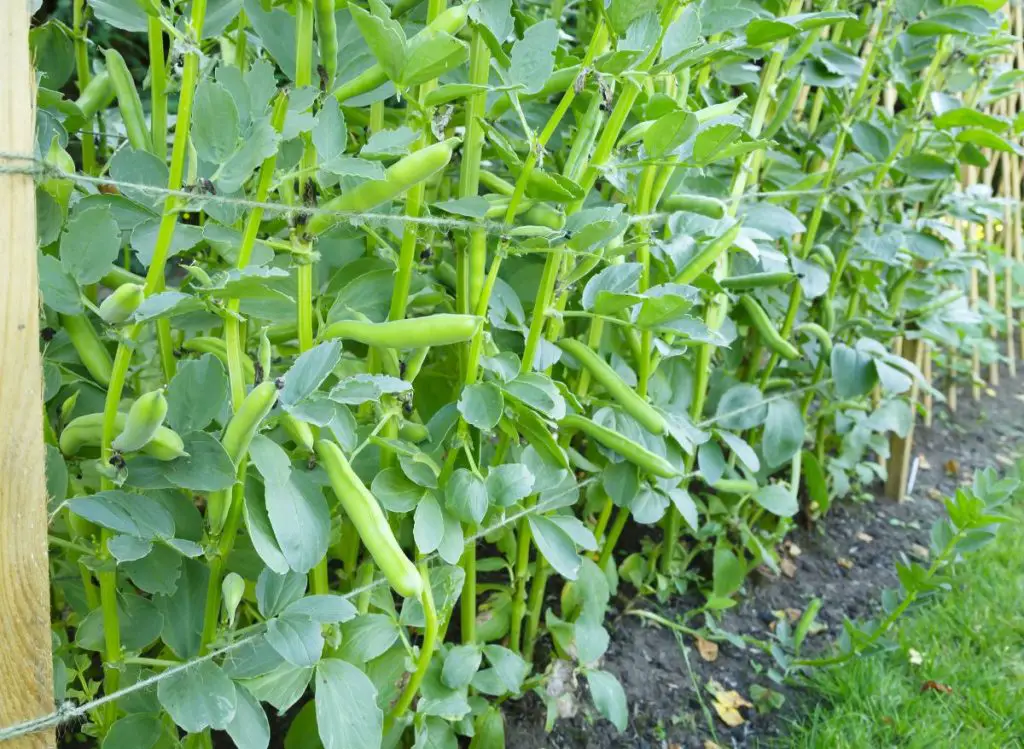
3- Borage (Borago Officinalis)
Borage works well as zucchini companion plants in the garden because it repels voracious insects and attracts beneficial bugs and honeybees to help pollinate your zucchini flowers.
Remember that borage thrives in full sun but will not be adversely impacted by light shade. It is easy to grow and will do well in most soil types, including nutritionally poor soil (Source: North Carolina State University)
Borage plants attract Pollinators, including bees and other wildlife, making them excellent zucchini companion plants.
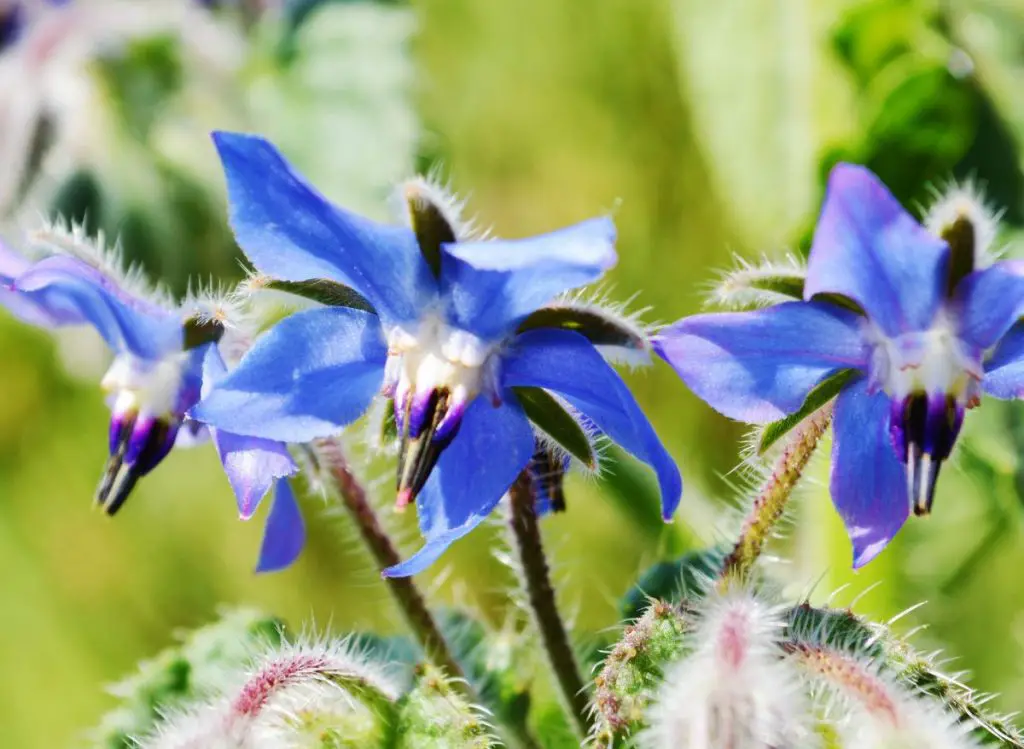
4- Radishes (Raphanus Sativus)
Radishes are good plants near summer squash and zucchini as they help repel common zucchini pests, including aphids, cucumber beetles, and squash bugs.
With their spicy flavor and crisp, juicy texture, radishes are good in salads and healthy snacks.
If you choose to add radishes, ensure you plant seeds from April through early May and seed again in August.
Radishes thrive in a well-drained, slightly acidic, neutral soil with a pH of 6 to 7. Radishes deter squash vine borers and beetles from invading zucchini patches, making them great companions to zucchini.
See also: How To Effectively Get Rid Of Cucumber Beetles Faster?
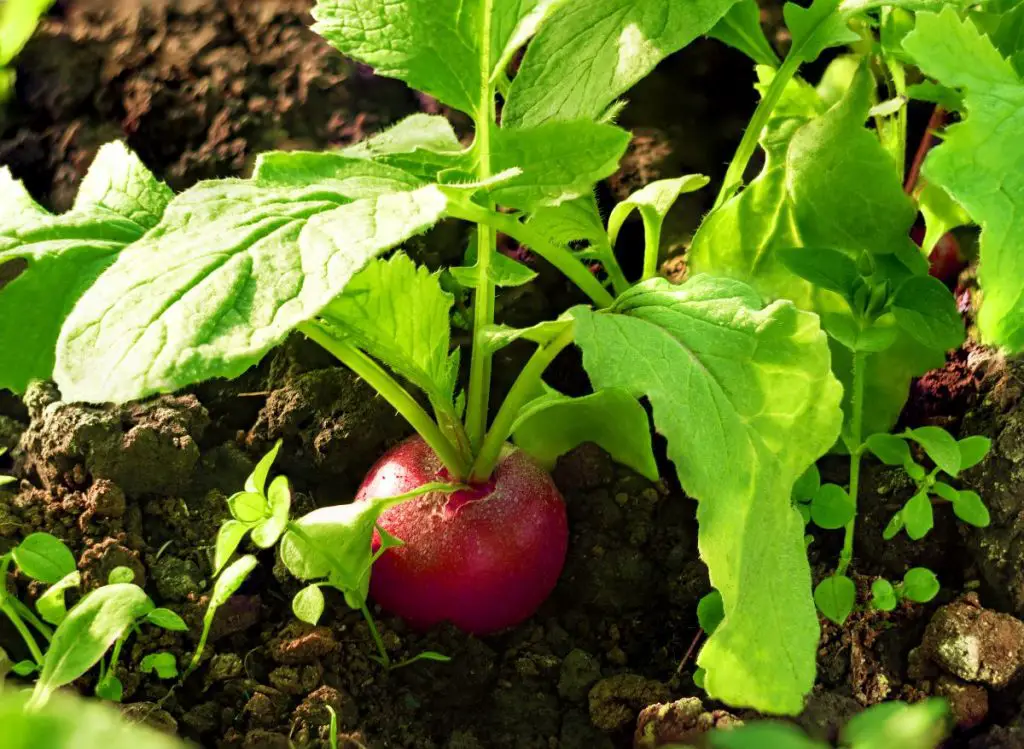
5- Garlic (Allium Sativum)
Plant a few garlic plants among zucchini to help keep aphids and other pests in check. Garlic grows well in full sun in well-drained soil rich in organic matter (Source: University of Wisconsin)
Garlic prevents aphids from the garden area, a common issue with zucchini. Planting garlic around zucchini will keep them keeps aphids off the squash plants.
Left unchecked, Aphids cause extensive damage; therefore, garlic greatly benefits the zucchini.
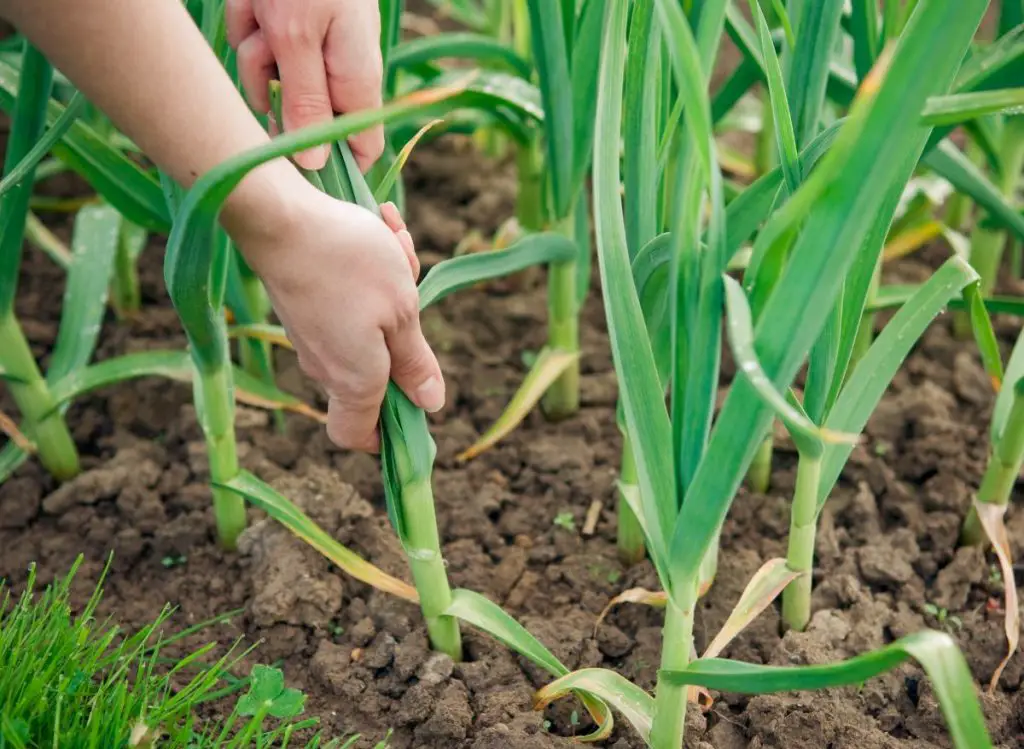
6- Peppermint (Mentha x Piperita)
Peppermint is an amazingly aromatic herb and is one of the oldest herbs used for ritual, culinary, and medicinal purposes.
I love sipping my tea with Moroccan peppermint. And the good news is that peppermint is a marvelous herb that is easy to care for and grows well with zucchini.
Peppermint helps deter pests and insects from squashes. Keep in mind that planting two heavy feeders can create competition between the herbs and the squash plants for vital nutrients.
Mint can also drive away tiny aphids that feed on zucchini and other vegetables.
Other herbs zucchini companion plants to add include:
- Oregano (Origanum vulgare)
- Lemon (Citrus limon)
- Balm (Melissa officinalis)
- Parsley (Petroselinum crispum)
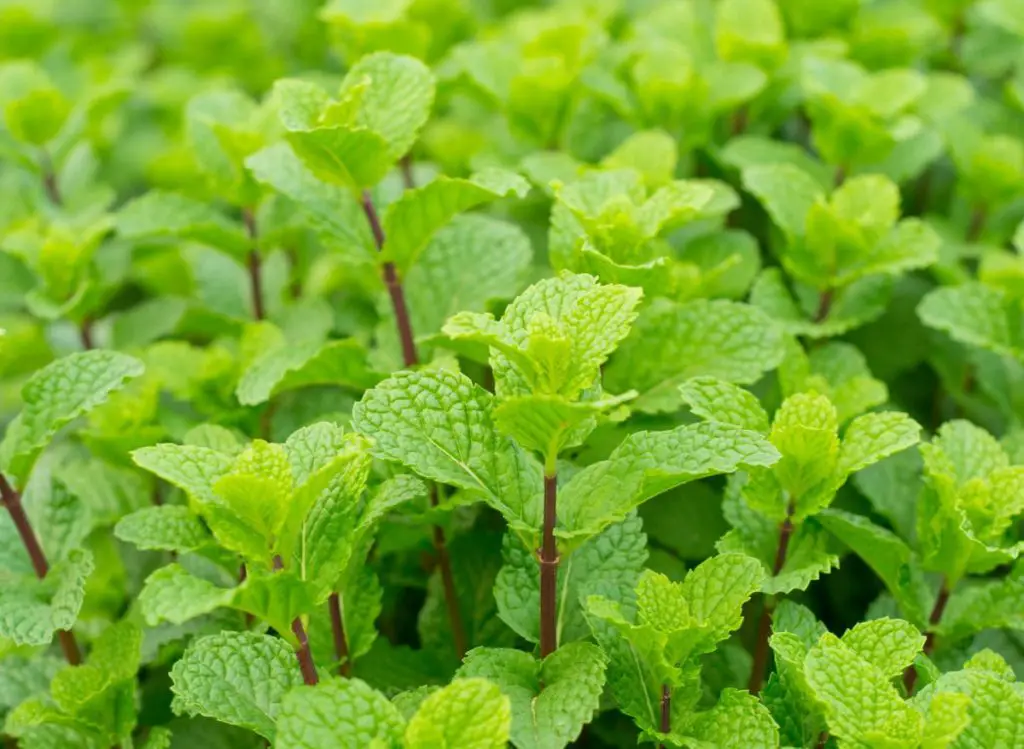
7- Peas (Pisum Sativum)
Like beans, peas are among the best zucchini companion plants because their roots provide nitrogen to ensure healthy zucchini growth.
Nitrogen plays a critical role in zucchini growth as it helps capture sunlight energy by photosynthesis leading to healthy growth and grain yield.
I suggest you plant your peas early to enhance the soil in spring and early summer before your zucchini plants reach maturity. The goal is to harvest your pea plants to provide zucchini with plenty of space to sprawl.
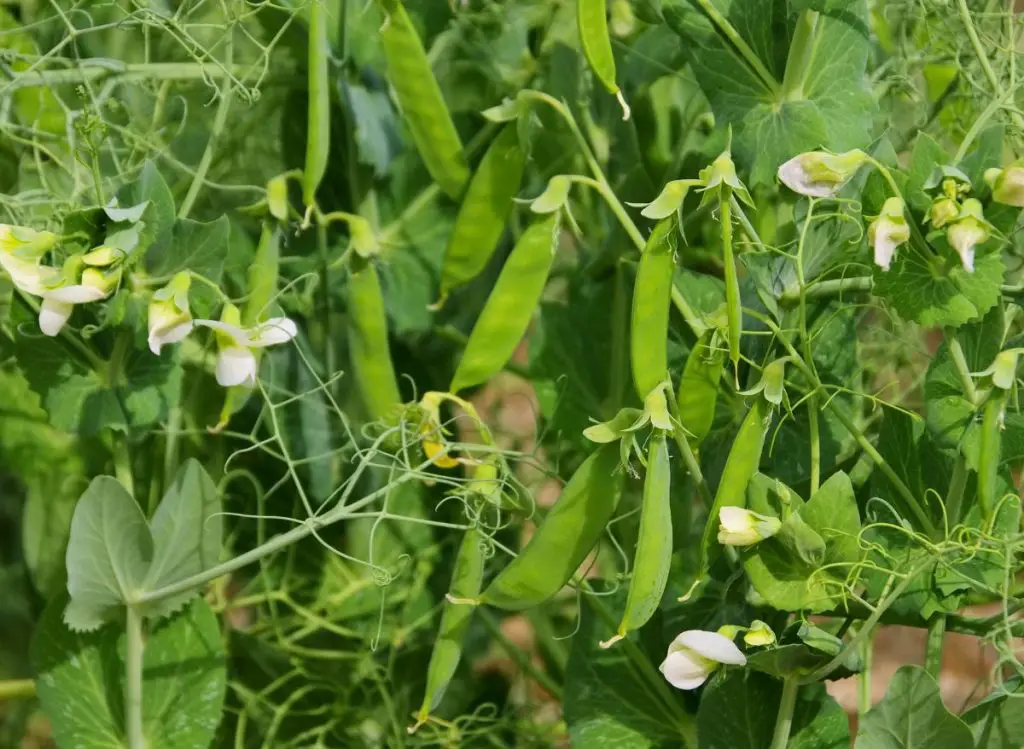
8- Dill (Anethum Graveolens)
Dill plants help repel squash beetle and flea beetles and are a great companion plant for many crops, including zucchini.
Using herbs, including dill as a zucchini companion plant, helps to attract beneficial insects, such as lacewing and hoverflies.
Dill is a beautiful addition to gardens because it naturally attracts pollinators like bees. In addition, it repels unwanted pests, including spider mites, aphids, and cabbage pests, making it a great companion for Zucchini.
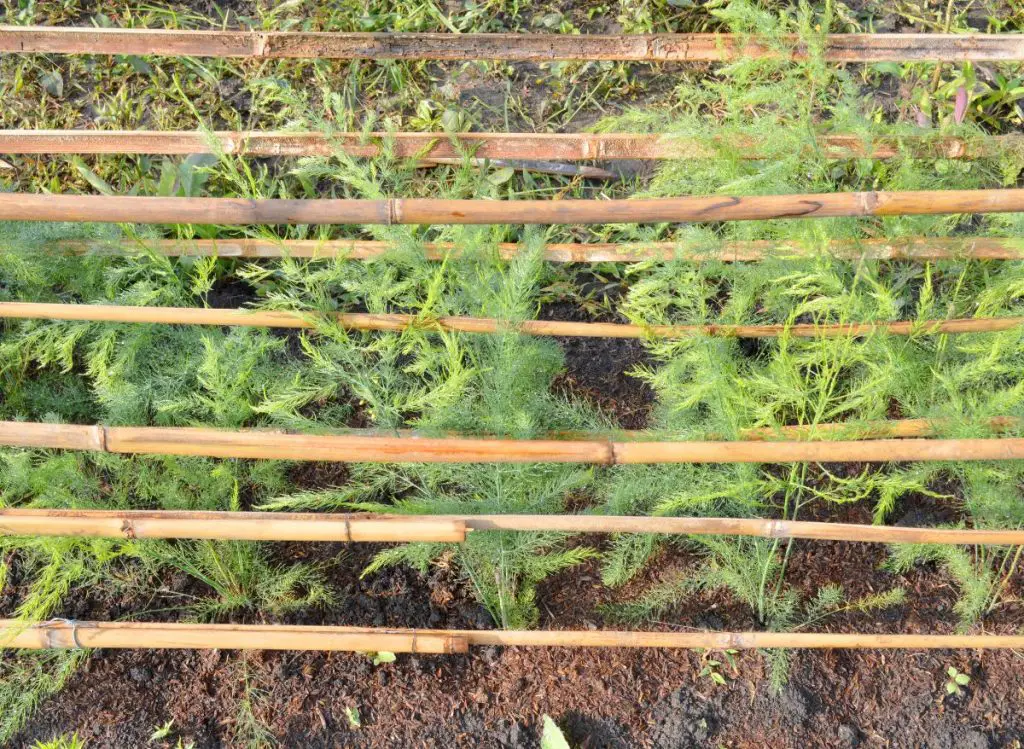
9- Nasturtium (Tropaeolum Majus)
Many gardeners like to grow nasturtiums near zucchini plants to deter pests. Nasturtiums are tasty to aphids and squash beetles, drawing them away from your zucchini.
Nasturtium’s most common insect pests are cabbageworm and aphids (Source: the University of Wisconsin). When planting near zucchini, they will draw cabbageworm and aphids away from your zucchini.
In addition, nasturtiums are great at attracting pollinators into the garden with their beautiful orange, yellow and red flowers.
I suggest you plant your nasturtium seeds near the circumference of your zucchini patch.
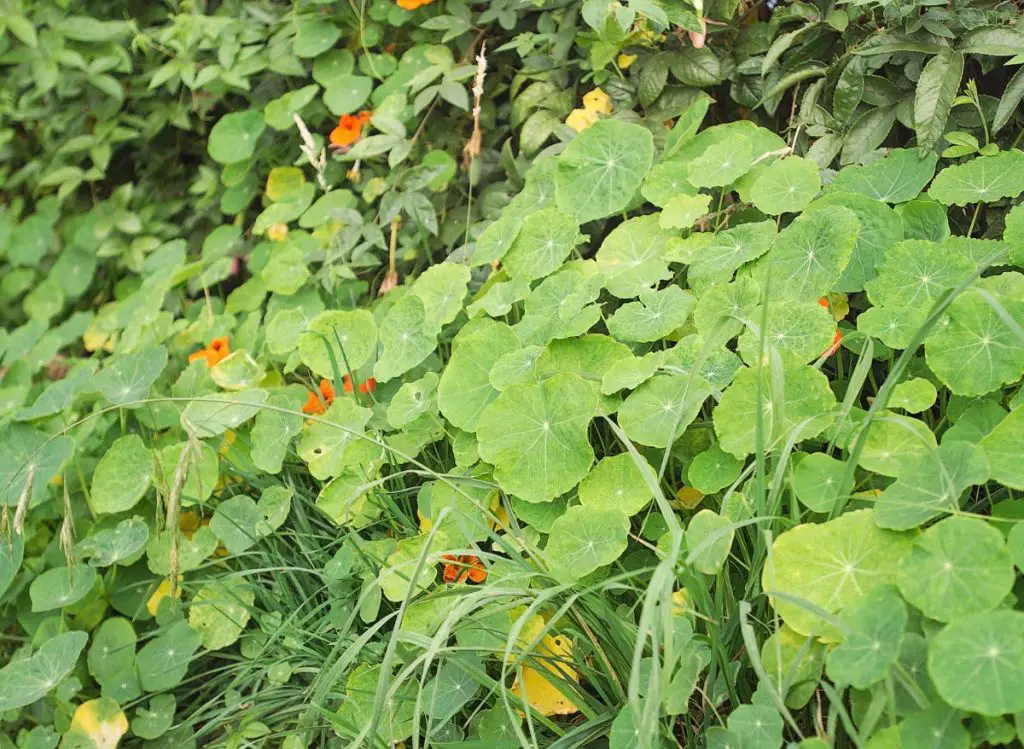
10- French Marigold (Tagetes Patula)
Like nasturtiums, marigolds repel striped cucumber beetles, squash insects, and cabbage loopers. Marigolds attract various beneficial insects that prey on bad bugs, which is a very positive attribute.
Marigolds planted around zucchini release an aroma that most pests dislike and may help discourage nematodes. Furthermore, marigolds elevate the beauty of your garden.
French marigolds require full sun and well-drained soil and ensure you plant them about 6 to 9 inches (15-23 cm.)
French marigolds are easy to grow and care for. Once adequately planted, they require little care other than watering, particularly in warm or dry weather conditions.
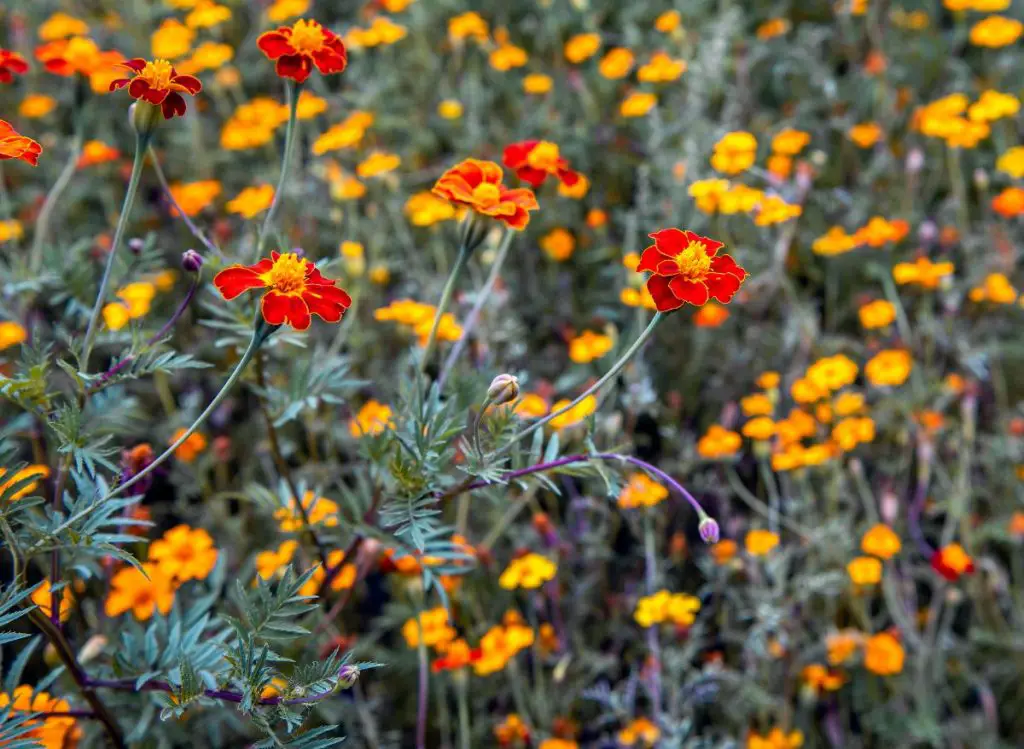
11- Catnip (Nepeta Cataria)
Adding Catnip to your garden is suitable for your Zucchini and can help make your garden cat-friendly.
Planting catnip along vegetable beds’ outer border will help repel aphids, ants, and squash bugs. In addition, catnip can even prevent mice, rats, weevils, and other rodents.
The best time to plant catnip is spring or fall. When planting catnip, keep space between 18 to 20 inches (45.5. to 51 cm.).
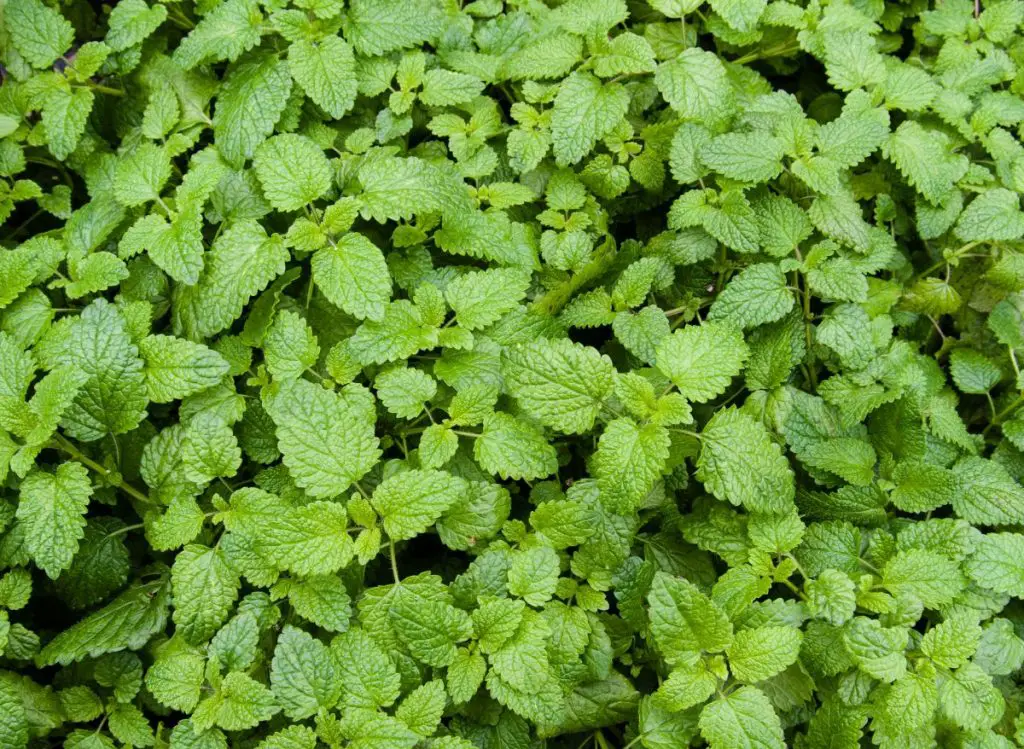
12- Blue Hubbard Squash (Cucurbita maxima ‘Blue Hubbard’)
Blue hubbard squash is one of the best zucchini companion plants for pest control. Anyone who grows squash has probably experienced problems with squash bugs and vine borers. Adding blue Hubbard squash is one of the best ways to deter these two common pests.
The blue Hubbard plants generally serve as a sacrificial trap crop, drawing unwanted pests away from your zucchini crop and preventing damage.
I suggest you plant the blue Hubbard plants about three to four weeks before planting your zucchini and put them on the periphery of the vegetable garden, a few feet (cm) away from your zucchini.
You might also enjoy reading: 19 Fall Vegetables To Grow In Pots, How To Care For Each.
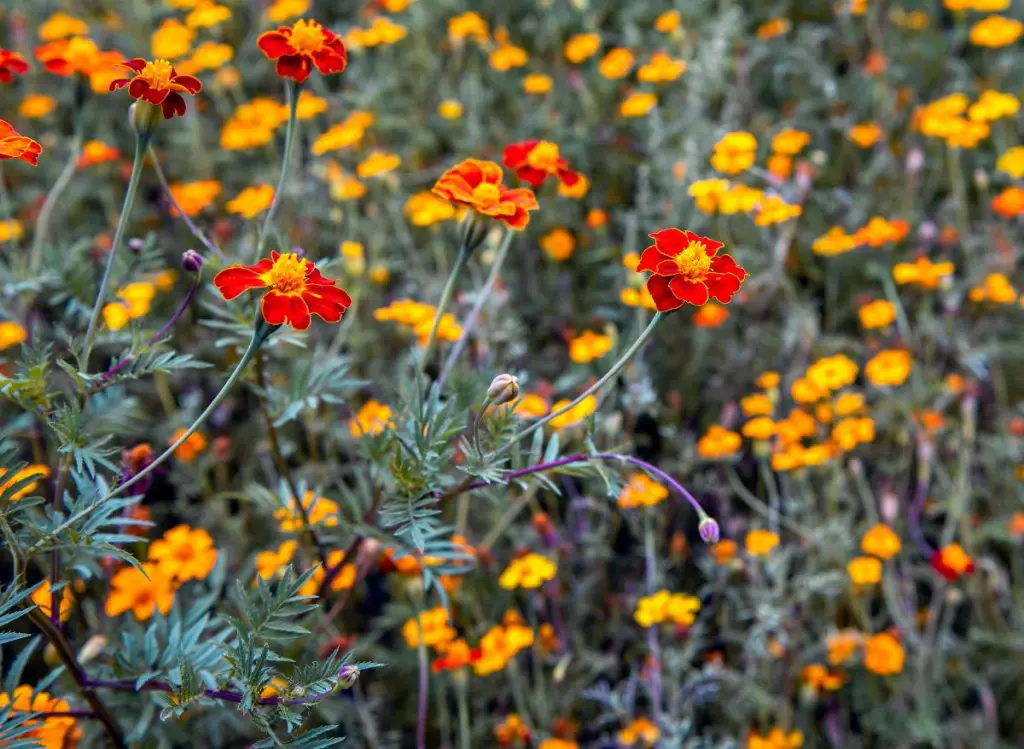
13- Chives (Allium schoenoprasum)
Chives are among these strong-smelling herbs that will deter aphids with their odor. Even though delicious to humans, their smell repels harmful pests to zucchini, including aphids and cucumber beetles.
Chives are an easy-to-grow herb that will not compete with your zucchini for space and attract pollinators when flowering.
The pretty purple flowers will also attract more ladybugs, parasitic wasps, and rove beetles, keeping pest populations in check.
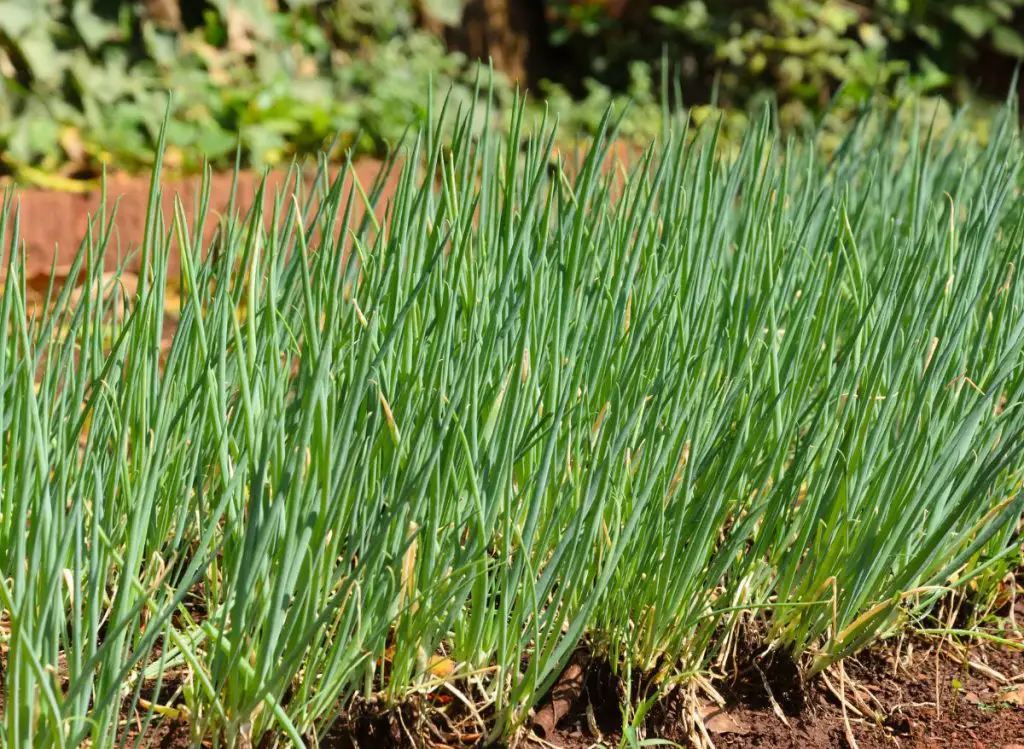
Wrapping Up
These are the most effective zucchini companion plants; I encourage you to pick 1 or 2 plants from the list discussed in this article and add them to your garden to promote the healthy growth of your zucchini plants.
Whichever plants you choose, ensure you understand their ideal growing conditions for better results.



